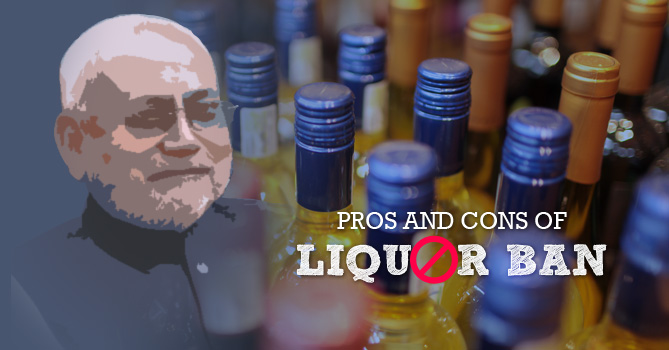I am against any form of ban for the simple reason that it causes collateral damage. It either stifles someone’s freedom or imposes a totalitarian ideology that leaves the affected people with no plank to stand on and defend. I had objected to beef ban and now, I present my reservations against blanket ban on liquor. You may judge me for this and question my morality, but that won’t change the truth that Bihar government’s decision on liquor ban violates the fundamental right of a citizen to decide what to eat and drink.
Bihar is not the only state to have found ‘dry’ crusaders who feel that the state-wide ban on possession and consumption of liquor is a “victory for public morals”. The US of the 20s and early 30s had seen the bitter battle between the anti-alcohol activists and ‘wets’. The Great Depression and the loss of revenue were compelling enough for the country to revoke the ban in 1933. While Nitish Kumar may have made a smart move and won hearts of anti-liquor activists of his states, he must surely look a worried man because he has to soon find ways to make up for the loss of revenue worth thousands of crores (Rs. 2,000 crores from the sale of IMFL and Rs. 4,000 crores from the sale of country liquor).
Can we call it yet another Masterstroke by Nitish Kumar?
Nitish may have his eyes set on 2019 general elections and he may have been buoyed up by appreciation he had received for his earlier moves such as making 50% reservation for women in panchayats and giving Mahadalits the access to government welfare schemes, but he is yet to explain his next masterstroke by which he can offset the revenue loss. For a state, whose gross fiscal deficit was 6.3 % of the state’s GDP (2013-14) it doesn’t augur well with those in charge of steering the state to economic growth.
Let’s Consider Singapore
Drawing an analogy between Bihar with Singapore may be an apple-to-orange comparison on several aspects, but not in case of ban on liquor. The city state was mulling strong legislation to prohibit drinking in public between 10:30 pm and 7 am in order to discourage migrant workers, who do low-paying jobs, from drinking. Singapore has already banned public drinking in Little India due to growing instances of expats getting drunk and behaving badly with fellow citizens. Does that deter people from coming out of Little India and drink elsewhere? I doubt. The main objective behind the Bihar government’s decision to turn it into a dry state is somewhat similar. It also wants to deter the poor from splurging on liquor and creating social instability by acts of domestic and regional violence.
Banning Liquor is akin to opening doors for illicit trafficking
Indians are good at circumventing laws. There can’t be better example than Gujarat. Incidentally, it is the only state in the country where the ban on liquor has continuously existed since the 60s. It awards death penalty for makers and sellers of homemade liquor. Yet, smuggling and illicit sale of alcohol are a commonality. Has the Bihar government also failed to factor in a major concern lurking at the border? Bihar shares a long open border with Nepal. This is tempting for the addicts to cross over to Nepal, drink to their fill and come back. Bihar’s pain will be Nepal’s gain. Moreover, does the ban necessarily ensure that there will be no deaths due to toxic liquor? Not really. Going by the reports of National Crime Records Bureau, Gujarat witnessed 29 cases of consumption of toxic liquor in 2013, while the neighbouring wet state, Rajasthan, had zero cases.
Even the Past is not that Rosy
Prohibition has never been an overwhelming success in India. Haryana, which has now seen proliferation of liquor shops, had once experimented with prohibition in 1996. The ban was removed in two years after the state government lost revenue worth Rs. 1,200 crores. In Andhra Pradesh, ban on liquor was imposed in 1995. When the government realised that it couldn’t fulfil its promises without the revenue generated from alcohol excise duty, the ban was lifted. In 2015, Mizoram lifted a 17-year-old ban. In fact, rampant illegal sale of liquor forced Nagaland Chief Minister to describe his state as the “wettest dry state”. Hence, a booze-free Bihar is not necessarily a better Bihar because the state might see a rise in bootlegging owing to the growth of a ‘black market’. Even if we discount the fact that large chunk of population will be rendered unemployed after this ban, we cannot hoodwink ourselves into believing that the prohibition will be implemented without any fallout.
